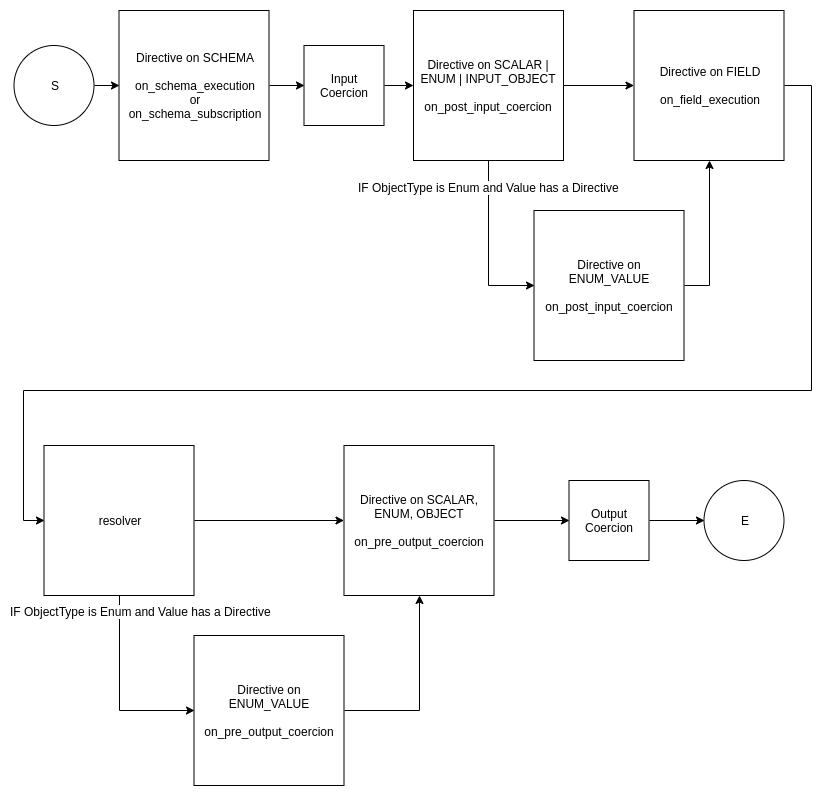Directive
Tartiflette bases most of its extensibility on directives. A directive will allow you to execute a behavior at different stages:
on_argument_execution: allows you to wrap the argument execution. (e.g. access rights, validate the input format...)on_field_execution: allows you to wrap the field execution. (e.g. resolve the field remotly, apply a specific rate limit on a field...)on_introspection: during an introspection query, allows you to wrap the schema fields to add metadata to fields or even to remove objects (e.g. dynamic introspection based on access rights)
New in 0.10.0:
on_post_input_coercion: allows you to hook the execution flow right after an input value/variable has beed coercedon_pre_output_coercion: allows you to mutate the result of the resolved value of a field before returning it
New in 1.1.0:
on_schema_execution: allows you to wrap the execution of a request (QUERYorMUTATION) in order to manipulate theinitial_valueor add extensions to the global result dict.on_schema_subscription: allows you to wrap the async generator of aSUBSCRIPTIONin order to manipulate theinitial_valueor add extensions to the gobal result dict.
How to declare a new directive?
directive @myDirective(
name: String = "Chuck"
) on FIELD_DEFINITION
type Query {
hello: String @myDirective(name: "Norris")
}
from typing import Any, Callable, Dict, Optional, Union
from tartiflette import Directive
@Directive("myDirective")
class MyDirective:
async def on_argument_execution(
self,
directive_args: Dict[str, Any],
next_directive: Callable,
parent_node: Union["FieldNode", "DirectiveNode"],
argument_definition_node: "InputValueDefinitionNode",
argument_node: Optional["ArgumentNode"],
value: Any,
ctx: Optional[Any],
) -> Any:
######################
# Add your code here #
######################
return await next_directive(
parent_node, argument_definition_node, argument_node, value, ctx
)
async def on_post_input_coercion(
self,
directive_args: Dict[str, Any],
next_directive: Callable,
parent_node: Union["VariableDefinitionNode", "InputValueDefinitionNode"],
value: Any,
ctx: Optional[Any],
) -> Any:
######################
# Add your code here #
######################
return await next_directive(parent_node, value, ctx)
async def on_field_execution(
self,
directive_args: Dict[str, Any],
next_resolver: Callable,
parent: Optional[Any],
args: Dict[str, Any],
ctx: Optional[Any],
info: "ResolveInfo",
) -> Any:
######################
# Add your code here #
######################
return await next_resolver(parent, args, ctx, info)
async def on_pre_output_coercion(
self,
directive_args: Dict[str, Any],
next_directive: Callable,
value: Any,
ctx: Optional[Any],
info: "ResolveInfo",
) -> Any:
######################
# Add your code here #
######################
return await next_directive(value, ctx, info)
async def on_introspection(
self,
directive_args: Dict[str, Any],
next_directive: Callable,
introspected_element: Any,
ctx: Optional[Any],
info: "ResolveInfo",
) -> Any:
######################
# Add your code here #
######################
return await next_directive(introspected_element, ctx, info)
async def on_schema_execution(
self,
directive_args: Dict[str, Any],
next_directive: Callable,
schema: "GraphQLSchema",
document: "DocumentNode",
parsing_errors: Optional[List["TartifletteError"]],
operation_name: Optional[str],
context: Optional[Dict[str, Any]],
variables: Optional[Dict[str, Any]],
initial_value: Optional[Any],
):
######################
# Add your code here #
######################
results = await next_directive(
schema,
document,
parsing_errors,
operation_name,
context,
variables,
initial_value,
)
###############
# Or/And here #
###############
return results
async def on_schema_subscription(
self,
directive_args: Dict[str, Any],
next_directive: Callable,
schema: "GraphQLSchema",
document: "DocumentNode",
parsing_errors: Optional[List["TartifletteError"]],
operation_name: Optional[str],
context: Optional[Dict[str, Any]],
variables: Optional[Dict[str, Any]],
initial_value: Optional[Any],
):
######################
# Add your code here #
######################
async for result in next_directive(
schema,
document,
parsing_errors,
operation_name,
context,
variables,
initial_value,
):
###############
# Or/And here #
###############
yield result
###############
# Or/And here #
###############
Decorator signature
name(str): name of the directiveschema_name(str = "default"): name of the schema to which link the directivearguments_coercer(Optional[Callable] = None): callable to use to coerce directive arguments
The arguments_coercer parameter is here to provide an easy way to override the default callable used internaly by Tartiflette to coerce the arguments of the directive. It has the same behaviour as the custom_default_arguments_coercer parameter at engine initialisation but impact only the directive.
Execution flow
Warning: This is valid since
1.1.0.
Directive hook execution flow is like:

Example
directive @directiveField on FIELD
directive @directiveScalar on SCALAR
directive @directiveEnum on ENUM
directive @directiveEnumValue on ENUM_VALUE
directive @directiveObject on OBJECT
directive @directiveInputObject on INPUT_OBJECT
directive @directiveArgument on ARGUMENT
directive @directiveSchema on SCHEMA
scalar aScalar @directiveScalar
enum anEnum @directiveEnum {
ONE @directiveEnumValue
TWO
}
input anInputObject @directiveInputObject {
anInputField: aScalar
}
type aType @directiveObject {
aField: aScalar @directiveField
anEnumField: anEnum @directiveField
}
type Query {
field1: aType
field2(anArgument: anInputObject @directiveArgument): aType
field3: anEnum
}
schema @directiveSchema {
query: Query
}
with Resolvers as:
@Resolver("Query.field1")
async def resolve_query_field1(parent, args, ctx, info):
return {"aField": "aValue", "anEnumField":"ONE"}
@Resolver("Query.field2")
async def resolve_query_field2(parent, args, ctx, info):
return {"aField": "aValue", "anEnumField":"TWO"}
@Resolver("Query.field3")
async def resolve_query_field3(parent, args, ctx, info):
return "TWO"
Query 1
query aQuery {
field1 {
aField
anEnumField
}
}
The resolution of Query.field1 will ran:
on_schema_executionof directivedirectiveSchema.Query.field1resolveron_pre_output_coercionof directivedirectiveObjectof typeaTypeoutput_coercerforObjectType
Then the resolution of aType.aField will ran (parrallely ran with aType.anEnumField):
on_schema_executionof directivedirectiveSchema.on_field_executionof directivedirectiveFieldonaType.aFieldaType.aFieldresolveron_pre_output_coercionof directivedirectiveScalaronaScalaroutput_coercerof the scalaraScalar
The resolution of aType.anEnumField will ran (parrallely ran with aType.aField):
on_schema_executionof directivedirectiveSchema.on_field_executionof directivedirectiveFieldonaType.anEnumFieldaType.anEnumFieldresolveron_pre_output_coercionof directivedirectiveEnumValuecauseONEhas a directiveon_pre_output_coercionof directivedirectiveEnumof enumanEnumoutput_coercerfor enum
Query 2
query aQuery {
field2(anArgument: {anInputField: 3}) {
aField
anEnumField
}
}
The resolution of Query.field2 will ran:
on_schema_executionof directivedirectiveSchemainput_coercerforInputObjectTypeinput_coercerfor argumentanInputFieldof typeaScalaron_post_input_coercionof directivedirectiveScalarof scalaraScalaron_post_input_coercionof directivedirectiveInputObjectof typeanInputTypeon_argument_executionof directivedirectiveArgumentfor argumentanArgumentQuery.field2resolveron_pre_output_coercionof directivedirectiveObjectof typeaTypeoutput_coercerforObjectType
Then the resolution of aType.aField will ran (parrallely ran with aType.anEnumField):
on_schema_executionof directivedirectiveSchema.on_field_executionof directivedirectiveFieldonaType.aFieldaType.aFieldresolveron_pre_output_coercionof directivedirectiveScalaronaScalaroutput_coercerof the scalaraScalar
The resolution of aType.anEnumField will ran (parrallely ran with aType.aField):
on_schema_executionof directivedirectiveSchema.on_field_executionof directivedirectiveFieldonaType.anEnumFieldaType.anEnumFieldresolver (methodatype_anenumfield_resolverreturned "ONE")on_pre_output_coercionof directivedirectiveEnumValuecauseONEhas a directiveon_pre_output_coercionof directivedirectiveEnumof enumanEnumoutput_coercerfor enum
Query 3
query aQuery {
field3
}
The resolution of Query.field3 will ran:
on_schema_executionof directivedirectiveSchema.Query.field3resolveron_pre_output_coercionof directivedirectiveEnumof enumanEnumoutput_coercerforEnumType
